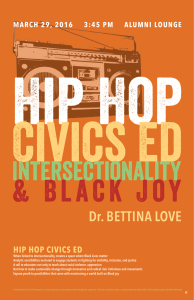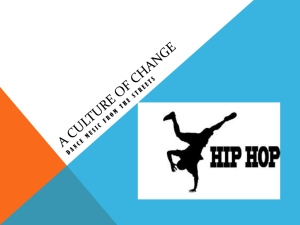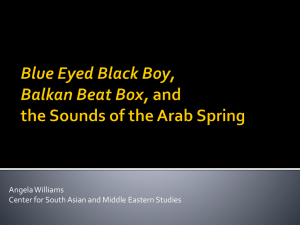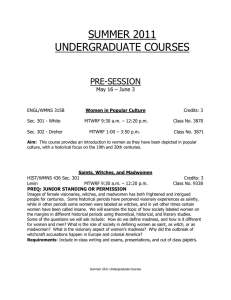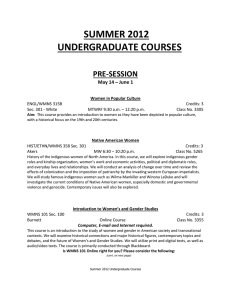Summer 2010 WGS Undergraduate Course Booklet
advertisement
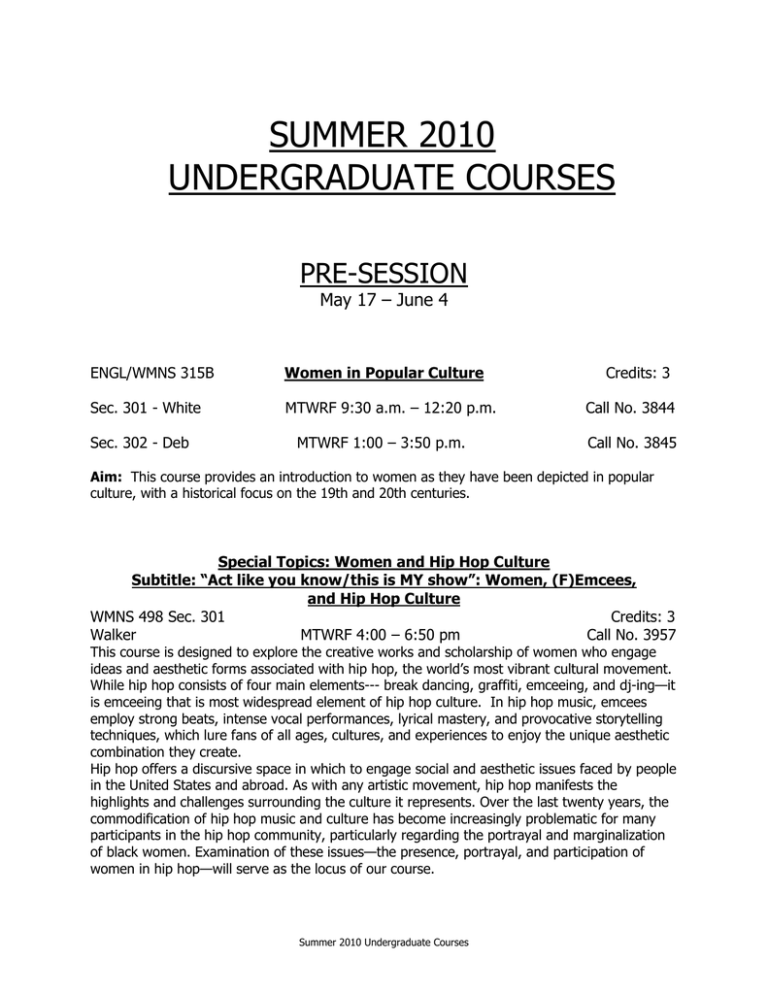
SUMMER 2010 UNDERGRADUATE COURSES PRE-SESSION May 17 – June 4 ENGL/WMNS 315B Women in Popular Culture Sec. 301 - White MTWRF 9:30 a.m. – 12:20 p.m. Sec. 302 - Deb MTWRF 1:00 – 3:50 p.m. Credits: 3 Call No. 3844 Call No. 3845 Aim: This course provides an introduction to women as they have been depicted in popular culture, with a historical focus on the 19th and 20th centuries. Special Topics: Women and Hip Hop Culture Subtitle: “Act like you know/this is MY show”: Women, (F)Emcees, and Hip Hop Culture WMNS 498 Sec. 301 Credits: 3 Walker MTWRF 4:00 – 6:50 pm Call No. 3957 This course is designed to explore the creative works and scholarship of women who engage ideas and aesthetic forms associated with hip hop, the world’s most vibrant cultural movement. While hip hop consists of four main elements--- break dancing, graffiti, emceeing, and dj-ing—it is emceeing that is most widespread element of hip hop culture. In hip hop music, emcees employ strong beats, intense vocal performances, lyrical mastery, and provocative storytelling techniques, which lure fans of all ages, cultures, and experiences to enjoy the unique aesthetic combination they create. Hip hop offers a discursive space in which to engage social and aesthetic issues faced by people in the United States and abroad. As with any artistic movement, hip hop manifests the highlights and challenges surrounding the culture it represents. Over the last twenty years, the commodification of hip hop music and culture has become increasingly problematic for many participants in the hip hop community, particularly regarding the portrayal and marginalization of black women. Examination of these issues—the presence, portrayal, and participation of women in hip hop—will serve as the locus of our course. Summer 2010 Undergraduate Courses -PRE-SESSION (CONT.)- To begin our course, we will discuss the definitions of hip hop and recognize women’s contributions to its success. Throughout the session, we will survey works of female hip hop artists and examine the ways in which they participate in a traditionally male dominated art form. We will also examine the scholarship that raises questions concerning the image of women in hip hop (by male and female artists) and discuss the relationship between feminism and hip hop. The writers who we will study come from various generations, ethnicities, geographical areas, socioeconomic statuses, religious beliefs, and sexualities. We will analyze the rhetorical strategies of the writers we study, consider historical and cultural contexts for their work, and reflect upon controversial nature the representations of women in hip hop culture. In this course, we will focus on four central questions: How do the artists we study employ techniques from African-American oral storytelling traditions? In what ways do these artists confront social ills and raise consciousness? How do these artists we analyze disrupt traditional categorizations of women? In what ways do female artists use hip hop as a discursive space to validate women’s experiences? Required texts include Sharpley-Whiting’s Pimps Up, Ho’s Down: Hip Hop’s Hold on Young Black Women, Souljah’a No Disrespect, Nissel’s The Broke Diaries, Hammad’s ZaatarDiva, Morgan’s When Chickenheads Come Home to Roost, selected essays, and, of course, the music of various female hip hop artists. Please contact the instructor for any questions or concerns: Carrie Walker carriejwalker@gmail.com EIGHT-WEEK SESSION May 17 - July 9 *TXCD 325 Sec. 401 Graham Woven and Nonwoven Textile Design MTWRF 8:15 a.m. -12:00 noon Credits: 3 Call No. 4041 *NOTE: For Women’s and Gender Studies credit, the student must complete a substitution form with the Women’s and Gender Studies Director. Special Fee - $35 Prerequisites: Junior standing; TXCD 206 Aim: Creative application of woven and non-loom textile construction techniques. The goals of this course are 1) to build the student’s textile vocabulary so fibers can be used as a means of expression, 2) to strengthen the student’s understanding of the design process as one of exploration and discovery and 3) to build the student’s critical thinking ability in relation to observing, analyzing and evaluating contemporary textile art, with an emphasis on the contributions of women artists. EIGHT-WEEK SESSION OTHER COURSES OF INTEREST These courses may or may not count toward a Women’s and Gender Studies major or minor, or the LGBTQ/Sexuality Studies minor. Please consult a Women’s and Gender Studies advisor before registering. Summer 2010 Undergraduate Courses China: Global Challenges: American and Chinese Perspectives POLS 398 Contact: Andrew Wedeman awedeman1@unl.edu Students could do an independent study with a gender component as part of this program. See the full description at: http://www.unl.edu/iaffairs/study_flyers/summer/POLSCHINA.shtml Rwanda: An Interdisciplinary Study of the 1994 Rwandan Genocide and Its Aftermath MODL 498 Contact: Chantal Kalisa mkalisa2@unl.edu Postgenocide Rwanda is an important site of knowledge from which we learn about violence, human rights, reconciliation, and justice. After two weekends preparing at UNL, students will spend two weeks in Rwanda, hosted by the Interdisciplinary Genocide Studies Center in Kigali. The program is open to students, both undergraduate and graduate, from all disciplines. See the full description at: http://www.unl.edu/iaffairs/study_flyers/summer/rwanda.shtml FIRST FIVE-WEEK SESSION June 7 – July 19 ARCH 481 Sec. 501 Kuska Women in Design MTWRF 9:00 – 10:35 a.m. Credits: 3 Call No. 3880 Aim: This course will study historical and contemporary contributions by women to the design professions related to the built environment. It will seek to examine the roles and values of women in design and their impact on the assumptions and issues currently held by the profession. We will evaluate design work by and about women seen in their aesthetic and intellectual context, and identify a feminist perspective and how it affects the workplace. Requirements: In-class participation, informal response journal, discussion, brochure, research project and presentation. Tentative Reading List: Berkeley and McQuaid, Architecture: A Place for Women; Hughes, ed., The Architect: Reconstructing Her Practice; selected readings from journals and books. Introduction to Women’s and Gender Studies WMNS 101 Sec. 700 Burnett and Leichner Online Course Computer, E-mail and Internet required. Summer 2010 Undergraduate Courses Credits: 3 Call No. 3961 -FIRST FIVE-WEEK SESSION (CONT.)- This course is an introduction to basic concepts of the study of women and gender in American society and transnational contexts. We will examine historical connections and major historical figures, contemporary topics and debates, and the future of Women’s and Gender Studies. Our online section of WMNS 101 shares the same philosophy, goals, and objectives as a traditional, face-to-face classroom setting. However, given that most Women’s and Gender Studies courses at UNL rely heavily on discussion-based learning and opportunities for students to grapple with new and challenging ideas (rather than memorization), the online version of the course has a heavy written component, both in personal blogs and through online discussion on a social networking website. In addition, students will demonstrate learning through weekly quizzes proctored in the UNL Arts and Sciences Testing Center; students MUST be able to take exams ON THE UNL CITY CAMPUS. Required Texts and Materials: 1. Feminist Frontiers (8th edition), Verta Taylor, Nancy Whittier, Leila J. Rupp; ISBN: 9780073404301 2. Articles, web pages, or videos linked through or posted on Blackboard at my.unl.edu 3. A computer with Microsoft Office (Word & PowerPoint), high-speed internet, audio playback capabilities, and the most recent versions of Quicktime Video, Adobe Flash Player, and Adobe Reader Software (both are free downloads). Note: the current version of Microsoft Office (which contains Word) is available for less than $20 at the UNL Computer store to current students. 4. A working knowledge of basic computer skills, including word processing, web navigation, email, and audio/video playback. Please contact the instructors for any questions or concerns: Tamy Burnett and Amber Harris Leichner Contact info: tburnett2@unl.edu and aleichner2@unl.edu Introduction to Women’s Literature ENGL/WMNS 215 Sec. 501 Staff MTWRF 9:15 – 10:50 a.m. Credits: 3 Call No. 3843 Aim: Introductory course for undergraduates interested in women’s studies and women’s literature. Introduces students to a selection of poetry, short fiction, and film texts. The course is designed to encourage students to reflect on their assumptions about women’s literature. For a further description, please contact the English Department. ENGL/WMNS 315B Women in Popular Culture Credits: 3 Sec. 501 - Staff MTWRF 11:00 a.m. – 12:35 p.m. Call No. 3846 Sec. 502 - White MW 5:30 p.m. – 9:45 p.m. Call No. 3848 Aim: To theorize and analyze as a class the representation of women in popular culture, focusing primarily on television, film, art, and literature Summer 2010 Undergraduate Courses -FIRST FIVE-WEEK SESSION (CONT.)- Women, Gender and Science WMNS/AGRI/NRES 385 Sec. 501 Boehner MTWR 4:15 -6:15 p.m. Credits: 3 Call No. 3963 This course will explore historical and contemporary perspectives about science through the lens of sex (male vs. female) and gender (men vs. women). It will highlight specific accomplishments of women in science and describe potential barriers women may encounter as they pursue a career in science. The course offers an opportunity to explore a much broader view of science than classically presented. The format will be multi-media lectures, in-class discussion of readings, student presentations and interviews of women scientists, and a short research paper. Topics include theories on biological determinism, gender and scientific subjectivity and biases, race and cultural considerations, language and gender norms, and ecofeminism. Current statistics will be analyzed about women in various science disciplines (basic and applied sciences including medical fields of study) and gender-related trends in early math and science education. Strategies for the inclusion of diverse participants in the process of science will be emphasized. Please contact the instructor for any questions or concerns: Dr. Patricia Boehner, (402) 467-1957, pboehner3@unl.edu FIRST FIVE-WEEK SESSION OTHER COURSES OF INTEREST These courses may or may not count toward a Women’s and Gender Studies major or minor, or the LGBTQ/Sexuality Studies minor. Please consult a Women’s and Gender Studies advisor before registering. CYAF 446 Sec. 501 Springer Addiction and Violence in Families MTWR 10:00 a.m. – 12:05 p.m. Taught via interactive TV Credits: 3 Call No. 1761 Addictions and violence across the life cycle. Theories; behavioral patterns; physiological and psychological impacts on individuals and the family; and implications for intervention. CYAF 495 Sec. 501 Family and Diversity: Working with GLBT Youth Credits: 3 Todd TR 1:15 - 5:05 p.m. Call No. 1765 -FIRST FIVE-WEEK SESSION (CONT.)- THE PURPOSE OF THIS COURSE IS TO INTRODUCE CONTEXTUAL CONSIDERATIONS AND RESEARCH-INFORMED GUIDELINES FOR WORKING WITH GAY, LESBIAN, BISEXUAL, AND TRANSGENDER YOUTH IN PROFESSIONAL settings such as educational, mental health, medical, and community outreach. The systemic context of GLBT youth, including developmental transitions, unique stressors, peer Summer 2010 Undergraduate Courses relationships, and familial environments, will be explored. Ways to help GLBT youth thrive will be emphasized. Course Rationale: This course augments foundational knowledge for Family Science majors through a concentrated emphasis on working with gay, lesbian, bisexual, transgendered, and questioning youth. For both Family Science majors and non-majors, this course promotes indepth understanding of the systemic context of GLBT youth and lends itself to application in diverse professional contexts. Course Objectives: Following successful completion of this course, you will be able to: Understand and utilize GLBT-inclusive language Have a working knowledge of developmental models of GLBT youth coming-out processes Understand the systemic context of GLBT youth, including developmental transitions, unique stressors, and familial and peer relationships Understand the unique needs of GLBT youth in medical, educational, mental health, juvenile justice, and out-of-home care settings Apply principles of working with GLBT youth to one’s professional area of emphasis Instructor: Maureen Todd, MS maureen.todd@huskers.unl.edu SOCI 225 Sec. 501 Marriage and Family Credits: 3 Staff TR 5:30 – 9:20 p.m. Call No. 3360 Historic marriage and family patterns. American family, past and present. Husband-wife relationships. Parent-child relationships. Family-society relationships. SECOND FIVE-WEEK SESSION July 12 – August 13 ENGL/WMNS 315B Sec. 601 – Staff Sec. 602 - Dreher Women in Popular Culture Credits: 3 MTWRF 11:00 a.m. – 12:35 p.m. Call No. 3849 MTWRF 2:00 – 3:35 p.m. Call No. 3850 Aim: To theorize and analyze as a class the representation of women in popular culture, focusing primarily on television, film, art, and literature. SOCI 200 Sec. 601 Staff Women in Contemporary Society TR 5:30 – 9:20 p.m. Summer 2010 Undergraduate Courses Credits: 3 Call No. 3352 This course is an introduction to the study of women in American society, emphasizing socialization, the home, the market place, and social change. SECOND FIVE-WEEK SESSION OTHER COURSES OF INTEREST These courses may or may not count toward a Women’s and Gender Studies major or minor. Please consult a Women’s and Gender Studies advisor before registering. PSYC 471 Sec. 601 Staff Human Sexuality and Society MTWRF 2:30 – 4:05 p.m. Cross-listed as EDPS 471, SOCI 471 and CYAF 471 Credits: 3 Call No. 3250 This class counts toward the LGBTQ/Sexuality Studies minor. An interdisciplinary approach to the study of human sexuality in terms of the psychological, social, cultural, anthropological, legal, historical, and physical characteristics of individual sexuality and sex in society. INDEPENDENT STUDY COURSES These courses were formerly known as Summer Reading Courses. They may or may not count toward a Women’s and Gender Studies major or minor. Please consult a Women’s and Gender Studies advisor before registering. Introduction to Women Writers ENGL 215931 Homestead Offered through Extended Education, 472-2175 Credits: 3 Aim: Introductory course for undergraduates interested in women’s studies and women’s literature. Introduces students to a selection of poetry, short fiction, and film texts. The course is designed to encourage students to reflect on their assumptions about women’s literature. COMM 380931 Staff Gender and Communication Offered through Extended Education, 472-2175 Credits: 3 Introduction to theory and research in gender and communication and a survey of research on similarities and differences between male and female verbal and nonverbal communication. Emphasis on examining the relationships among gender, language, social reality, and cultural values. Summer 2010 Undergraduate Courses HIST/WMNS 441931 Women and Gender in the U.S. Jacobs Offered through Extended Education, 472-2175 Credits: 3 This course explores U.S. womens and gender history from 1800 to the present. We will focus on the variety of womens experiences based on different class, racial and ethnic, and regional backgrounds. We will also look at changing ideas about gender in the U.S. over this 200-year period. The class focuses particularly on race, gender, and slavery; women and reform movements; gender and immigration; and womens activism. Students will read six memoirs and a womens history textbook to provide context and background. Four papers are required. Course Objectives: To analyze how gender systems have operated within the United States from 1800 to the present To explore the experiences of women in the U.S. across cultures and historical periods; To examine how women have attempted to define, maintain, or gain power in changing historical circumstances; To identify common dilemmas/struggles faced by women; To inquire into women's differences based on race, class, and other factors; To study how women have taken action to change their status within society; To improve reading, writing, and analytical skills. Required Readings: 1) Ellen Carol DuBois and Lynn Dumenil, Through Womens Eyes: An American History with Documents, 2nd edition, combined volumes 1 and 2 (New York: Bedford/St. Martins, 2009). 2) Frederick Douglass and Harriet A. Jacobs, Narrative of the Life of Frederick Douglass, An American Slave & Incidents in the Life of a Slave Girl, with introduction by Kwame Anthony Appiah (New York: Modern Library, 2000). 3) Elaine Goodale Eastman, Sister to the Sioux (Lincoln: University of Nebraska Press, 2004). 4) Zitkala-Sa (Gertrude Simmons Bonnin), American Indian Stories, Legends, and Other Writings (Penguin Classics, 2003.) 5) Monica Sone, Nisei Daughter (Seattle: University of Washington Press, 1979). 6) Melba Patillo Beals, Warriors Dont Cry, unabridged edition (Washington Square Press, 1995). Course Requirements and Evaluation: Four response papers, each worth 250 points. For undergraduates, papers should be 6-8 pages in length. For graduate students, papers should be 8-10 pages. Summer 2010 Undergraduate Courses
